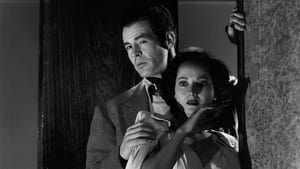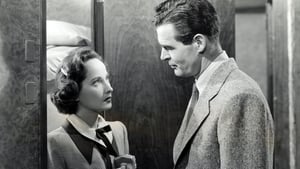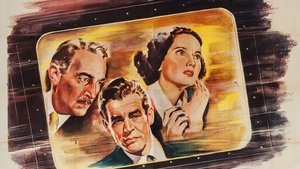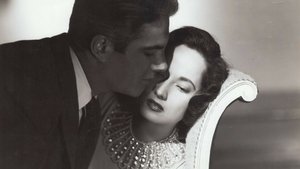Contact: [email protected]
Video Sources 0 Views
- Watch trailer
- Berlin Express

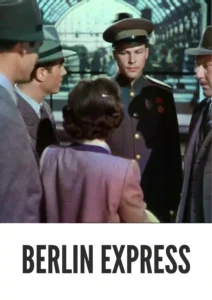
Berlin Express 1948 First Early Colored Films Version
Synopsis
Table of Contents
ToggleReview: Berlin Express (1948) – A Tense and Intriguing Post-War Thriller

Introduction
Berlin Express, released in 1948, stands as a gripping post-war thriller directed by Jacques Tourneur. Set against the backdrop of a divided Berlin, this film offers a tense and thought-provoking exploration of espionage, intrigue, and the complexities of rebuilding a shattered world. In this review, we’ll delve into the captivating world of Berlin Express and its enduring relevance in the realm of classic cinema.
Check The Full Colorized Movies List
Check Our Colorized Movies Trailer Channel
Understanding Berlin Express (1948): Director, Cast, and Genre
Directed by Jacques Tourneur, Berlin Express boasts a talented ensemble cast, including Robert Ryan, Merle Oberon, and Paul Lukas. The film falls within the genre of post-war espionage thrillers, known for their tense atmospheres, morally ambiguous characters, and intricate plotlines.
Exploring the World of Berlin Express (1948): Plot and Characters
Berlin Express follows a diverse group of passengers traveling aboard a train bound for Berlin in the aftermath of World War II. Among them are an American diplomat, a French officer, a German humanitarian worker, and a Russian soldier, each with their own secrets and agendas. When a mysterious assassination plot is uncovered, the passengers must work together to uncover the truth and prevent a catastrophic act of terrorism.
The Art of Film Colorization
While Berlin Express was originally filmed in black and white, its early colorized version adds a new layer of depth to its atmospheric visuals. The colorization process enhances the film’s gritty realism and captures the nuances of its post-war setting with striking clarity.
Early Colored Films: A Brief History
The history of early colored films is marked by innovation and experimentation as filmmakers sought to enhance the visual appeal of their movies. From hand-tinted frames to pioneering technicolor processes, the evolution of colorization techniques transformed the cinematic landscape, offering audiences a new way to experience the drama and intensity of classic films.
Berlin Express (1948) and Its Early Colored Version
The decision to release Berlin Express in a colorized format was made with the intention of immersing audiences in the gritty realism of its post-war setting and enhancing the film’s visual impact. While some purists may prefer the original black and white version, the early colorized edition of Berlin Express adds a new layer of depth to its atmospheric cinematography and captures the moral ambiguity of its characters with breathtaking clarity.
The Debate Over Film Colorization
The debate over film colorization continues to divide audiences and industry professionals alike. While some argue that colorization breathes new life into classic films and makes them more accessible to modern audiences, others maintain that it compromises the artistic integrity of the original work. As technology advances and filmmaking techniques evolve, the debate over colorization remains a topic of ongoing discussion within the film community.
Examining Berlin Express (1948) as an Early Colored Film
Viewing Berlin Express in its early colorized iteration offers audiences a fresh perspective on its gritty realism and morally complex characters. The colorization process enhances the film’s atmospheric cinematography and captures the tension and intrigue of its post-war setting with stunning clarity. As viewers are drawn into the web of espionage and deception, they are treated to a visual feast that immerses them in the complexities of rebuilding a shattered world.
Influence and Legacy: Berlin Express (1948)’s Impact on Cinema
Berlin Express is widely regarded as a classic of the post-war espionage thriller genre that continues to captivate audiences with its tense atmosphere and intricate plot. Its exploration of themes such as espionage, intrigue, and the complexities of rebuilding a shattered world resonates with viewers of all ages, making it a timeless classic that continues to influence filmmakers and inspire new generations of cinephiles.
Director’s Cinematic Legacy: Beyond Berlin Express (1948)
Jacques Tourneur’s directorial legacy extends far beyond Berlin Express, encompassing a diverse body of work that includes acclaimed films such as Cat People and Out of the Past. As one of the most respected filmmakers of his generation, Tourneur was known for his ability to craft compelling narratives that explored the darker aspects of the human experience with depth and nuance. Berlin Express stands as a testament to his talent and creativity, solidifying his reputation as one of the great auteurs of classic Hollywood cinema.
Themes Explored in Berlin Express (1948)
At its core, Berlin Express explores themes of espionage, intrigue, and the complexities of rebuilding a shattered world in the aftermath of World War II. Through its tense atmosphere and morally ambiguous characters, the film offers a nuanced portrayal of the challenges faced by individuals grappling with the aftermath of war and the uncertain future that lies ahead.
Reception and Controversy Surrounding Berlin Express (1948)
Upon its release, Berlin Express received widespread critical acclaim for its tense atmosphere, intricate plot, and powerful performances. While the decision to release the film in a colorized format sparked debate among purists, its enduring popularity has cemented its status as a timeless classic of the post-war espionage thriller genre.
Where to Watch Berlin Express (1948) Online
For those eager to experience Berlin Express for themselves, the film is readily available on popular streaming platforms such as Amazon Prime Video, Google Play Movies, and iTunes. Whether viewed in its original black and white format or its early colorized iteration, Berlin Express offers a cinematic experience that is both tense and visually stunning.
FAQs About Berlin Express (1948)
1. Is Berlin Express based on a true story?
No, Berlin Express is a fictional film that explores the complexities of espionage and intrigue in the aftermath of World War II. While the film’s storyline may draw inspiration from real-life events, its characters and plot are works of fiction.
2. Who starred in Berlin Express?
Berlin Express features a talented ensemble cast, including Robert Ryan, Merle Oberon, and Paul Lukas. Each actor delivers a powerful performance, bringing their characters to life amidst the backdrop of post-war Berlin.
3. What is the central message of Berlin Express?
At its core, Berlin Express explores the challenges of rebuilding a shattered world in the aftermath of World War II. Through its tense atmosphere and morally complex characters, the film offers a nuanced portrayal of the struggles faced by individuals grappling with the uncertainties of a post-war society.
4. Why was Berlin Express released in a colorized format?
The decision to release Berlin Express in a colorized format was made with the intention of immersing audiences in the gritty realism of its post-war setting and enhancing the film’s visual impact. While some purists may prefer the original black and white version, the early colorized edition of Berlin Express adds a new layer of depth to its atmospheric cinematography and captures the moral ambiguity of its characters with breathtaking clarity.
5. What is the legacy of Berlin Express?
Berlin Express is widely regarded as a classic of the post-war espionage thriller genre that continues to captivate audiences with its tense atmosphere and intricate plot. Its exploration of themes such as espionage, intrigue, and the complexities of rebuilding a shattered world resonates with viewers of all ages, making it a timeless classic that continues to influence filmmakers and inspire new generations of cinephiles.
6. Are there any sequels or remakes of Berlin Express?
No, there have been no official sequels or remakes of Berlin Express. However, the film’s enduring popularity has inspired countless reinterpretations and homages in various media. Nonetheless, none have captured the tense atmosphere and intricate plot of the original 1948 classic.
7. Where can I watch Berlin Express online?
For those eager to experience Berlin Express for themselves, the film is readily available on popular streaming platforms such as Amazon Prime Video, Google Play Movies, and iTunes. Whether viewed in its original black and white format or its early colorized iteration, Berlin Express offers a cinematic experience that is both tense and visually stunning.
Conclusion
In conclusion, Berlin Express (1948) stands as a gripping post-war thriller that continues to captivate audiences with its tense atmosphere, intricate plot, and powerful performances. Whether viewed in its original black and white format or its early colorized iteration, Jacques Tourneur’s insightful direction and the stellar performances of the cast offer a cinematic experience that is both thought-provoking and visually stunning. As viewers are drawn into the web of espionage and intrigue, they are treated to a visceral journey that challenges their perceptions of right and wrong and leaves a lasting impact on their understanding of the complexities of rebuilding a shattered world. Berlin Express remains a timeless classic that continues to enthrall and inspire audiences around the world.
